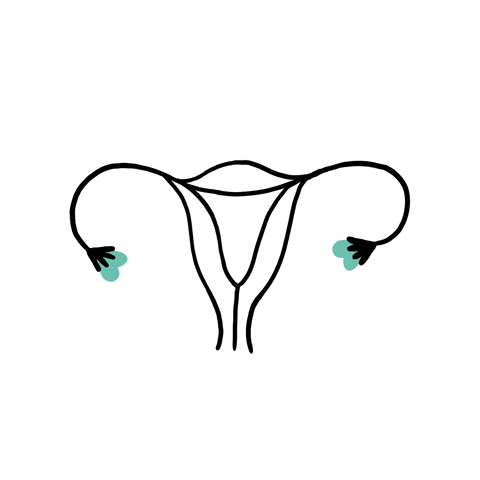
Published on Aug 28, 2023
Last modified on Sep 24, 2024
PCOS & Menopause: What’s The Connection?
4 min read
Heard of polycystic ovarian syndrome — or PCOS, for short? We joined forces with the experts at Allara to dive into the nitty gritty on:
- What PCOS is
- The prevalence of PCOS
- Common PCOS symptoms
- How to know whether your symptoms are due to PCOS or menopause
- Whether menopause affects women with PCOS differently
- How to test for PCOS
- Treatment options (medications, lifestyle changes, etc)
PCOS 101
PCOS — which globally affects between 8-13% of women (with 70% of cases undiagnosed 😮) — may cause high levels of testosterone and blood glucose (aka blood sugar), along with lower levels of progesterone.
It’s typically diagnosed when at least two of the following three symptoms are present:
- Polycystic ovaries
Multiple small follicles on the ovaries, which can be diagnosed via a pelvic ultrasound. - Elevated androgen levels
Androgens are male sex hormones — in this case, testosterone. When elevated, they can cause a slew of symptoms, including excess hair growth most often noticeable on the upper lip and chin (hirsutism), thinning hair, balding, and acne. Hyperandrogenism may also be associated with infertility. - Irregular periods
Caused by either not ovulating every month or not ovulating at all.
PCOS is the most common endocrine disorder among women in their reproductive years, but it doesn’t disappear once we’re peri or postmenopausal (if ONLY!). For younger and older women alike, it can be a metabolic syndrome, increasing our risk for type-2 diabetes and cardiovascular disease.
How do I know if my symptoms are due to menopause or PCOS?
There are common menopause symptoms that can ALSO appear in those with PCOS, including:
- Irregular or missed menstrual cycles (although with perimenopause, this symptom will be new whereas in PCOS, it’s a lifelong symptom)
- Weight gain
- Mood changes
- Fatigue
- Headaches
- Difficulty sleeping
- Changes in body hair (either hair growth in the face and chest or hair loss/thinning hair)
However, some symptoms are more unique to the hormonal changes of perimenopause, including:
Also, keep in mind that the age of symptom onset is an important consideration when figuring out whether menopause or PCOS is the culprit.
“Most women get the diagnosis of PCOS in their 20s or 30s when they have difficulty conceiving, but most symptoms of PCOS often start around the time of the first menstrual period,” explains Dr. Stacy Henigsman, Medical Lead at Allara. “Women typically first seek treatment when they have irregularities with their menstrual cycle or when they have trouble conceiving.”
Does menopause affect women with PCOS differently?
Presence & severity of menopause symptoms
Research shows that women with PCOS tend to experience fewer hot flashes than those without the condition. However, they do experience more hirsutism (extra hair growth) and vaginal dryness.
Additional risk factors
Women with PCOS are at an increased risk for endometrial cancer, but not for ovarian or breast cancer.
How do I know if I have PCOS?
Think you may have PCOS? “It’s estimated that between 5-10% of women in the U.S. have PCOS, but that less than half of all women are diagnosed correctly,” says Henigsman. “That’s why it’s so important to see a PCOS specialist for your diagnosis and care.”
Leading up to your visit, be sure to track your symptoms and the dates of your menstrual cycle.
Blood test
If you’re experiencing at least two of the three symptoms listed above, your provider will likely conduct a blood test to rule out other causes.
For example, if you’re experiencing irregular periods, lab work can test for pregnancy, levels of prolactin (hormone made in the pituitary gland of the brain), thyroid-stimulating hormone levels (TSH), and follicle-stimulating hormone levels (FSH). Your doctor may also test for luteinizing hormone levels (LH) — if it’s elevated with normal or decreased FSH, that can result in the ovaries producing more androgen.
Ovarian ultrasound
Ultrasounds are used to scan for small cysts (aka follicles) — although keep in mind that some women with PCOS may not have cysts on their ovaries.
“It’s estimated that between 5-10% of women in the U.S. have PCOS, but that less than half of all women are diagnosed correctly. That’s why it’s so important to see a PCOS specialist for your diagnosis and care.” —Dr. Stacy Henigsman, Medical Lead at Allara
PCOS treatment options
Remember, the PCOS care plan is going to look different for everyone. Says Henigsman, “what works for one woman may not work for another. That’s why it’s important to speak with your medical provider about all treatments for PCOS so that the appropriate plan can be made just for you.”
Medications
- Oral contraceptives (with combined estrogen & progestin or progestin only pills)
- Progestin-containing intrauterine device (IUDs) to regulate irregular periods
- Metformin to help regulate insulin levels (metformin may also help with weight loss when combined with lifestyle changes)
- Spironolactone is an anti-androgen medication that helps reduce hair growth and improve acne
- Topical medications such as Eflornithine cream to reduce excess facial hair growth
Lifestyle & diet
- 🍅 Mediterranean diet
While there isn’t one best diet for PCOS, the Mediterranean diet has earned a lot of hype. It’s low in saturated fats and animal proteins, rich in antioxidants and fiber, anti-inflammatory, low-carb, and low-sugar. And because it kicks most refined and concentrated sugars to the curb and focuses instead of non-starchy veggies, beans, fruits, and whole grains, it’s considered a “low-glycemic index” diet — meaning it won’t dramatically spike our blood sugar. - 🥗 Ground flaxseed
Research shows that 30 grams of ground flaxseed per day may help reduce inflammation and high glycemic effects of PCOS. Try tossing it into your smoothie, stirring it into oatmeal, or sprinkling it on your yogurt bowl or salad. - 💤 Focus on sleep hygiene
“Sleep hygiene” refers to the lifestyle and behavioral practices that take place during the in-between time when we’re not sleeping. Refer to our complete sleep guide for a list of our founding physician, Dr. Anna Barbieri’s, favorite daily habits to begin incorporating. - 💪 Take steps to manage weight
Incorporating regular exercise is important, but remember: you can’t out-exercise a poor diet. For a full list of expert tips and recommendations, refer to our complete guide to weight changes.
Supplements
- Inositol
Inositol is a sugar naturally produced in the body. It can also be found in foods such as beans, nuts, cantaloupe, oats, wheat germ, beef liver, and most citrus (with the exception of lemon). Taken in supplement form, it may help improve ovarian function, reduce insulin resistance, and lower androgen levels. - Vitamin D
Vitamin D plays a powerful role in insulin resistance, which is why it’s recommended for women with polycystic ovary syndrome. - Omega 3s
Omega-3 fatty acids have been shown to reduce inflammation and help support insulin resistance for those with PCOS.
As with anything you put into your body, taking dietary supplements can also involve health risks. You should consult a women’s health medical professional before taking supplements and inform your doctor about any supplements, as well as any medications you already take, since there may be interactions.


